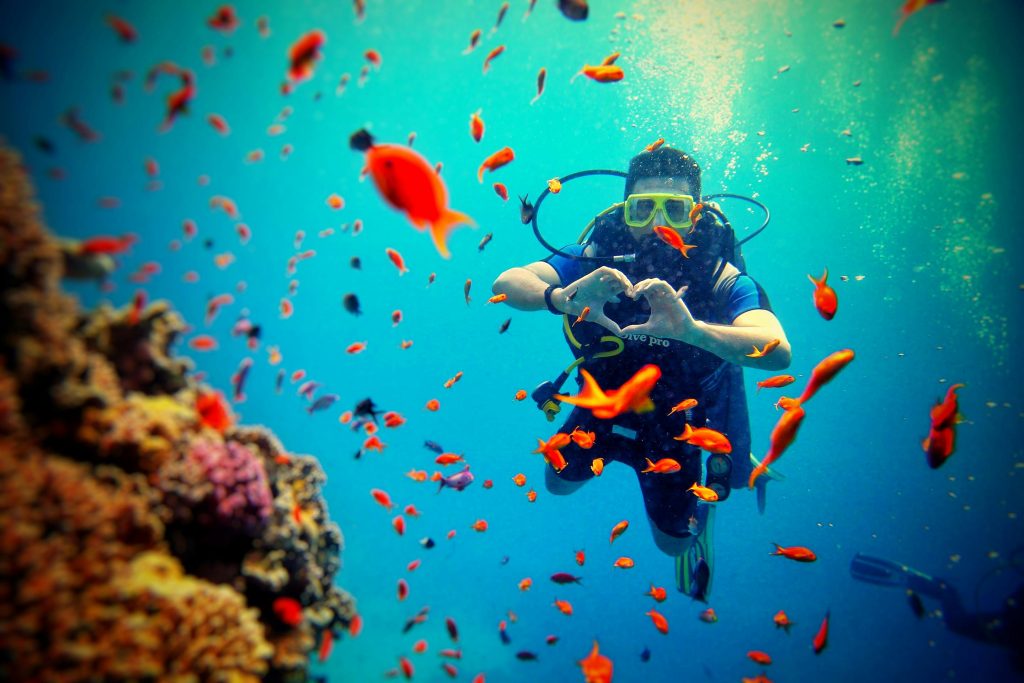Planning a scuba diving holiday? Whether you’re drifting among shoals of tropical fish or descending to explore deep wrecks, having the right scuba diving travel insurance is essential.
Scuba diving is a unique and exhilarating way to explore the underwater world. However, it also comes with risks including decompression sickness and emergency evacuations from remote dive sites. One study estimated that 3 in every 100 dives result in scuba diving related injuries. These risks are often not covered by standard insurance, making it crucial to find the right scuba diving travel insurance.
Our guide will help you understand what scuba diving travel insurance covers, what to look for in a policy and how to ensure you’re fully protected before taking the plunge

What is Scuba Diving Travel Insurance?
Scuba diving travel insurance is travel cover that protects you against the unique risks of diving. Alongside standard travel insurance benefits, it covers medical treatment (including hyperbaric chamber therapy), emergency evacuation and repatriation, loss of equipment, trip cancellations and personal liability whilst diving abroad.
Does Standard Travel Insurance Cover Scuba Diving?
Many standard travel insurance policies consider scuba diving to be an extreme activity and either exclude it entirely or have low depth restrictions, often only allowing you to dive to 18m.
Most travel insurers will only cover you for scuba diving if it is an incidental activity to your trip and not the main purpose. These policies would not cover you on a diving focussed holiday
Essential elements such as hyperbaric chamber treatment and emergency evacuation are frequently excluded, key components of a scuba diving travel insurance policy.
What to Look for When Choosing Scuba Diving Travel Insurance
When comparing policies, look for the following key features:
1. Depth Limits
Insurance policies usually state a maximum dive depth. Common thresholds are:
- Up to 18-30m (standard recreational diving)
- Up to 40m (advanced recreational diving)
- 50m+ for technical or deep diving (usually requires an upgrade / premium add on)
✓ Check the policy covers the maximum depth for your planned dives and certification level
2. Emergency Evacuation
Remote dive sites may require costly air or sea evacuation if you need transporting to a medical care facility.
✓ Look for policies that cover emergency medical evacuation
3. Hyperbaric Chamber Treatment
The National Institute of Health estimates that there are 3 cases of decompression sickness (DCS) per 10,000 recreational scuba dives. Furthermore, Divers Alert Network (DAN) state that is is the second most commonly reported dive illness/injury.
In the event of DCS, you will need emergency treatment in a hyperbaric chamber. This can be costly and may not be covered by standard travel insurance. Some policies will only cover the hyperbaric treatment and not the cost of transporting you to the chamber. DAN estimate the average cost of an air ambulance to be €20,000.
✓ Check the policy explicitly states that hyperbaric chamber treatment is covered
✓ Ensure the cost of transport to a chamber is covered
4. Dive Equipment Cover
Some policies include cover for:

- Lost. stolen or damaged dive gear
- Rental equipment
- Dive gear delayed in transit
✓ Make sure to check limits and excess amounts
5. Trip Cancellation or Interruption
Dive trips are expensive and bookings are often non-refundable
✓ Check your policy covers:
- Cancellation up to the full trip cost
- Cancellation due to illness or severe weather
- Dive centre closure or bankruptcy
- Returning home early in an emergency
6. Personal Liability
This covers legal costs or compensation if you accidentally injure someone or damage equipment / property whilst diving.
✓ Check your policy includes personal liability cover
7. Diving as the main purpose of the trip
Check whether your policy covers scuba diving as the main purpose of your trip. Many insurers only cover it as an incidental activity, which may not apply if your holiday is based around diving.
✓ If you are planning a diving-focussed holiday, choose a policy that explicitly covers diving trips. All policies in our curated list include this cover.
When Am I Not Covered by Scuba Diving Travel Insurance?
Typical exclusions include:
- Diving against medical advice or when medically unfit
- Diving under the influence of alcohol or non-prescribed drugs
- Diving for gain and reward, not recreational purposes
- Travel to a country against FCDO advice
- Diving in breach of safety or depth guidelines
- If you fly within 24 hours of diving
What If I Already Have Standard Travel Insurance
If you already have a standard travel insurance policy which excludes or limits dive coverage, another option is dive accident insurance. This is designed to cover the specific medical risks associated with scuba diving. It typically includes emergency medical evacuation and repatriation costs, personal accident benefits and search and rescue costs in the event of a dive accident. Broader travel cover such as trip cancellation, lost baggage and medical care for non-medical diving emergencies is usually excluded.
✅ See here for more information on dive accident insurance plus our curated list of policies
Scuba Diving Travel Insurance Frequently Asked Questions
Will Scuba Diving Travel Insurance Cover Me if I Am Not Qualified?
Generally yes, you will be covered if you are certified or in the process of obtaining a recognised dive qualification.
What types of diving are excluded?
Exclusions vary between policies, so it’s essential to check the specific terms and conditions. For instance, some insurers will cover cave diving in certain situations if you’re appropriately trained, while others exclude any dives in overhead environments.
Does scuba diving travel insurance have an age limit?
Again, do check the specific policy wording. Many policies will have an upper age limit, for example the DAN Sport policy does not cover any person aged 75 or over.
Final Thoughts
Scuba diving travel insurance provides peace of mind for underwater adventures. Look for a policy with suitable depth limits which covers emergency medical treatment and evacuation plus equipment and cancellation. With the right cover in place, you can focus on enjoying your trip.
✅ Check out our curated list of scuba diving travel insurance policies
✅ Read our guide to finding liveaboard dive insurance for your liveaboard trip
